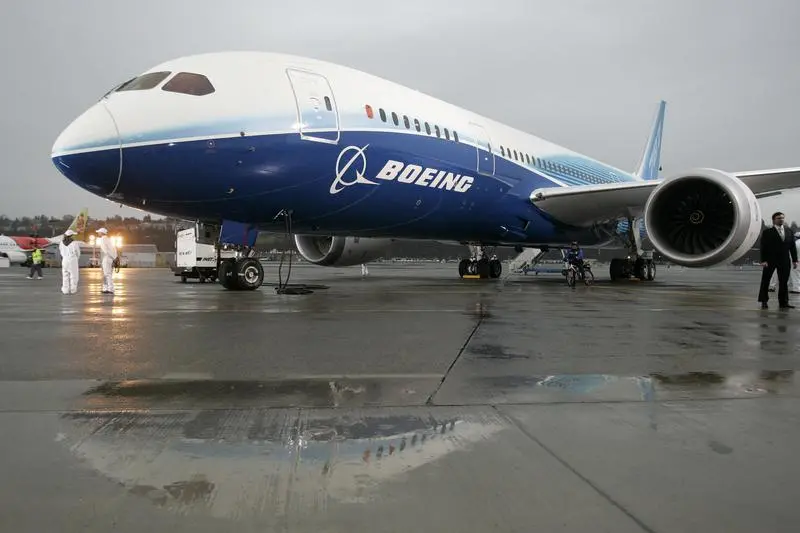PHOTO
The aviation industry will have to rely on fuel-based sources of energy “for a long time” as the launch of the first petroleum-electric or purely electric aircraft is decades away from becoming a reality, an official from the United States-based Boeing aerospace company said in Dubai this week.
Recently, several big plane manufacturers have been investing in the development of relatively cheaper aircraft models, such as Boeing’s 787 Dreamliner model and Airbus’s A330neo, which are more fuel efficient or rely more on electric power supplies. Boeing’s 787 Dreamliner made its first commercial flight in 2011. Six years later, its European rival Airbus celebrated the first trial flight of its A330neo aircraft on October 19.
Speaking during a panel discussion at the World Green Economy Summit in Dubai on Tuesday, Darrin Morgan, director of sustainable fuels strategy at Boeing said fuel will remain the main energy source for airplanes for the foreseeable future.
“When we started looking at the energy system that will feed our future need for fuel, or the industry’s need for fuel, we realised two things: We were going to need liquid fuels for a very long time and we [will] probably be one of the last sectors that will be using liquid fuels and therefore we want to make sure that those fuels are meeting our strategic needs in the industry,” Morgan said.
He said that Boeing and other aircraft manufacturers have invested in companies developing aircraft models that rely on the hybrid technology which combines fuel and electric sources.
A Boeing-backed start-up, based in the United States, announced earlier this month it is aiming to bring a small hybrid-electric commuter aircraft to market by 2022.
According to Morgan, the model will operate “where essentially the take-off power is electric but then once you get in cruise you switch to something liquid”.
“That is most likely going to be the first baby step, probably a decade to two-decades away,” he added.
Speaking to Zawya in an interview on the sidelines after the panel, Morgan said the first challenge facing the adoption of the hybrid or electric technologies in the aviation industry is weight. “To store electrical energy in a battery or a chemical energy in a battery and get it out as electrons… is much heavier than liquid fuels.”
“A major challenge at this point why liquid fuel is going to be in our future for a very long time is its performance on a per kilo basis. The amount of energy per kilo for liquid fuel is much higher than what you can get from batteries today,” he added.
Further Reading:
© ZAWYA 2017
Recently, several big plane manufacturers have been investing in the development of relatively cheaper aircraft models, such as Boeing’s 787 Dreamliner model and Airbus’s A330neo, which are more fuel efficient or rely more on electric power supplies. Boeing’s 787 Dreamliner made its first commercial flight in 2011. Six years later, its European rival Airbus celebrated the first trial flight of its A330neo aircraft on October 19.
Speaking during a panel discussion at the World Green Economy Summit in Dubai on Tuesday, Darrin Morgan, director of sustainable fuels strategy at Boeing said fuel will remain the main energy source for airplanes for the foreseeable future.
“When we started looking at the energy system that will feed our future need for fuel, or the industry’s need for fuel, we realised two things: We were going to need liquid fuels for a very long time and we [will] probably be one of the last sectors that will be using liquid fuels and therefore we want to make sure that those fuels are meeting our strategic needs in the industry,” Morgan said.
He said that Boeing and other aircraft manufacturers have invested in companies developing aircraft models that rely on the hybrid technology which combines fuel and electric sources.
A Boeing-backed start-up, based in the United States, announced earlier this month it is aiming to bring a small hybrid-electric commuter aircraft to market by 2022.
According to Morgan, the model will operate “where essentially the take-off power is electric but then once you get in cruise you switch to something liquid”.
“That is most likely going to be the first baby step, probably a decade to two-decades away,” he added.
Speaking to Zawya in an interview on the sidelines after the panel, Morgan said the first challenge facing the adoption of the hybrid or electric technologies in the aviation industry is weight. “To store electrical energy in a battery or a chemical energy in a battery and get it out as electrons… is much heavier than liquid fuels.”
“A major challenge at this point why liquid fuel is going to be in our future for a very long time is its performance on a per kilo basis. The amount of energy per kilo for liquid fuel is much higher than what you can get from batteries today,” he added.
Further Reading:
- Solar Impulse wants to work with Abu Dhabi on electric planes
- Solar-powered commercial planes feasible
- Saudi Arabia to outline renewable energy strategy at Abu Dhabi forum
- Zawya’s special coverage on the World Green Energy Summit 2017
© ZAWYA 2017





















